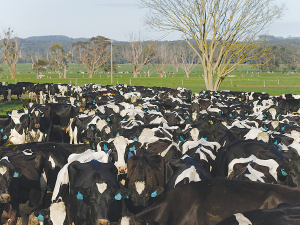Milk processors and emissions
OPINION: Reducing greenhouse gas (GHG) emissions – especially scope 3 emissions that occur on the farm – has been on the agenda of leading dairy companies for many years.
 For Australian farmers, knowing their carbon footprint will be the first step towards reducing emissions.
For Australian farmers, knowing their carbon footprint will be the first step towards reducing emissions.
Rising input costs are affecting Australian dairy farmers, making it more important than ever to ensure that the farm is operating efficiently and not wasting money, says Dairy Australia.
It says Australian farmers also increasingly need to reduce on-farm greenhouse gas (GHG) emissions to meet industry and supply chain emissions reduction targets, community, insurance and finance market expectations.
For farmers, a first step to identifying opportunities for improved on-farm efficiency and addressing the need to reduce GHG emissions can be as simple as knowing what their carbon footprint is.
By mapping out their farm's current carbon footprint, it can help them determine strategies which not only lower input costs and improve profitability but can also reduce carbon emissions.
Dairy Australia says the Australian dairy industry is committed to undertaking action to reduce its emissions across the whole supply chain. In 2015, the industry set a goal of a 30 per cent reduction in emissions intensity by 2030. Evidence of the industry's commitment is reported each year through the Australian dairy industry Sustainability Framework Report.
"Markets, investors and communities expect agrifood industries, especially livestock-based industries, to play their part in reducing emissions to help the world keep global warming to under two degrees," says Elissa McNamara, national lead for climate and energy - Dairy Australia.
"Most processors are required by regulation to report their GHG emissions and suppliers need to demonstrate that they are doing what they can to reduce emissions. Investors also want evidence of activities to reduce emissions and help limit global warming."
Carbon and biodiversity markets have been developed across the world as a mechanism to incentivise emissions reduction or carbon sequestration across all industries, including agriculture, giving farmers an opportunity to realise the value of their environmental stewardship.
While an attractive notion for many farmers, carbon markets are complex and difficult to sort through and identify how they successfully participate in a way that is right for the business.
Dairy Australia says the first step before taking any action is for farmers to understand their baseline carbon emissions - whether it be soil carbon or farm's total emissions - so they can identify where the opportunities are. This step is also critical to measuring and reporting on improvements over time.
Dairy Australia has developed a range of free tools to help farmers understand their on-farm emissions and how carbon markets operate.
The Australian Dairy Carbon Calculator (ADCC) has recently been updated and helps farmers calculate the effect of different GHG emissions abatement strategies on total farm emissions. It estimates the carbon dioxide, methane and nitrous oxide emissions of a dairy enterprise. The calculator is free to access and allows farmers to calculate the impact of adopting different emissions reduction strategies.
A seminar on rural dispute resolution has been organised at Lincoln University, Christchurch this month.
The legacy of Dr Peter Snow continues to inspire as the recipients of the 2023 and 2024 Peter Snow Memorial Awards were announced at the recent National Rural Health Conference.
One of Fonterra’s global customers, Mars is launching an ambitious sustainable dairy plan to work with dairy farmers and cut emissions by 50%.
Beef + Lamb New Zealand chief executive for the past eight years, Sam McIvor is heading for new pastures at Ospri, which runs NZ’s integrated animal disease management and traceability service.
The world's largest wool scouring facility, WoolWorks Awatoto plant in Napier, is back operating at full capacity.
A year on and the problems created by Cyclones Hale and Gabrielle has largely dropped off the radar of media and politicians.